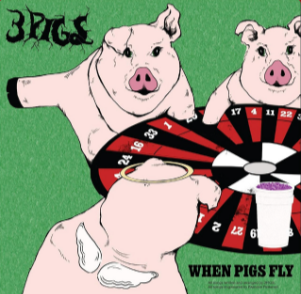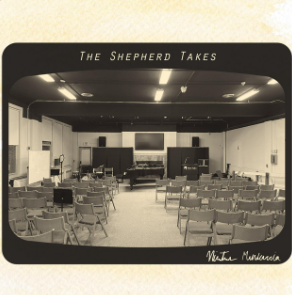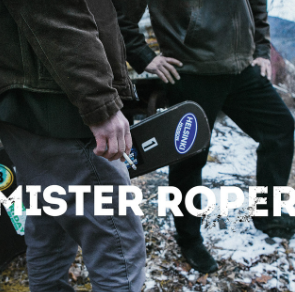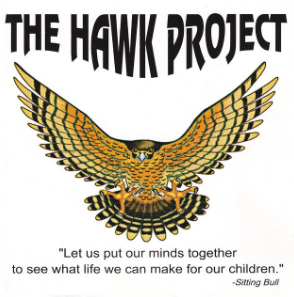Capstone
Music Education and the Pre-Professional World
When you're a kid in the school orchestra, a college student in a garage band or an adult plucking on the guitar to relieve stress, you are engaging in a commendable form of self-expression. But if you’re a music major in college, you'll likely hear: "What are you going to do with that?" And if you pursue it as a career, you'll get: "You’re still doing the music thing?" “What’s your real job?”
Nicola Kelly is a fourth-year music major at SUNY New Paltz with a concentration in classical violin performance. The violin has been her main instrument since she was assigned an instrument in fifth grade for her elementary school’s orchestra. Kelly fell in love with music. She attended orchestra camps during summer breaks and joined youth orchestra groups.
In high school, Kelly began to take the prospect of becoming a professional musician seriously. She auditioned for college music programs, which eventually landed her at SUNY New Paltz to study under Chrisitana Fortune Reader.
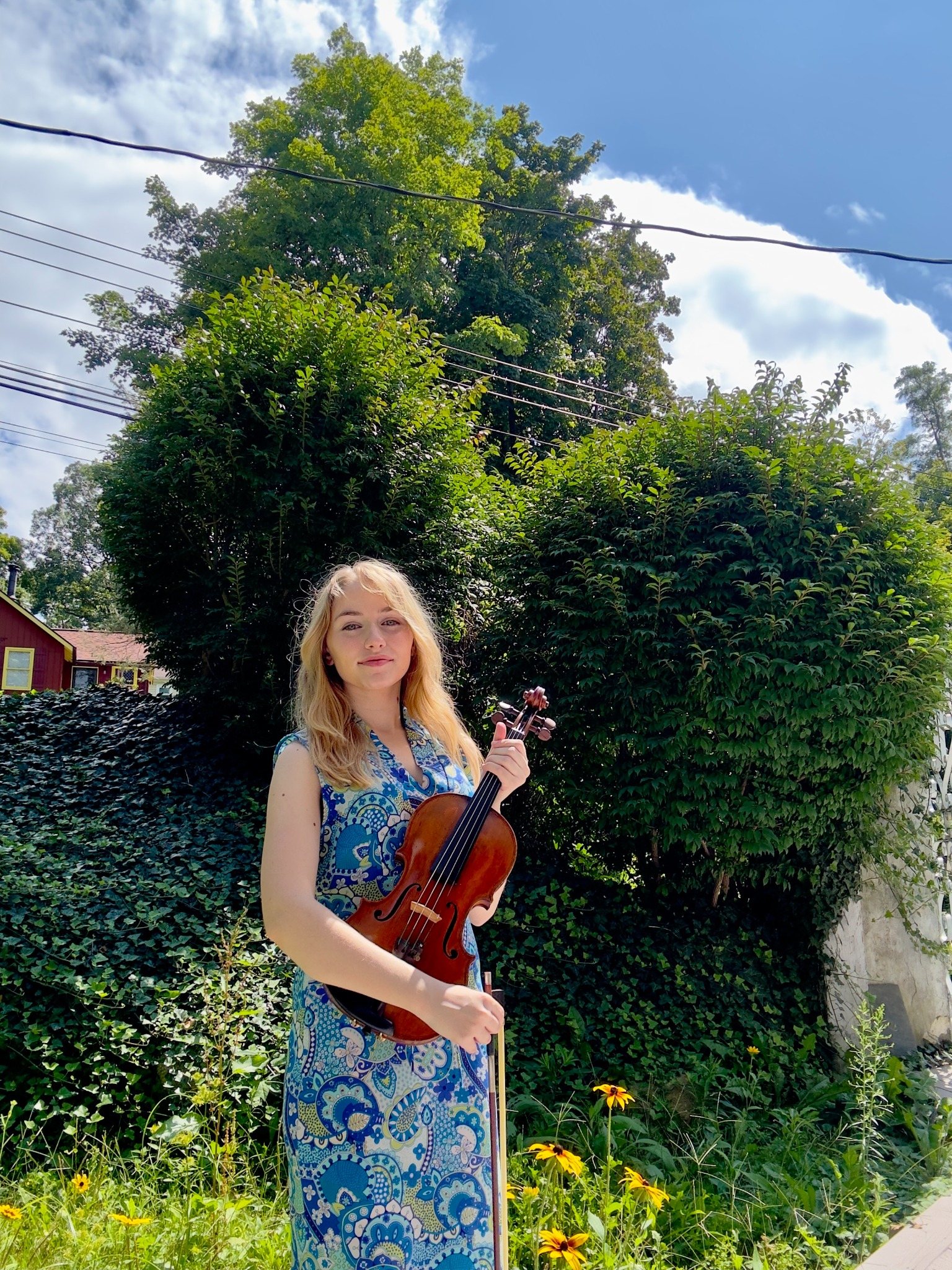
“I originally really wanted to stick to the side of education mostly when it came to music, but I think as I got more experience performing, I was like, ‘I really like this, this is a lot of fun,’” said Kelly. She performed at music festivals, including the International Music Festival of the Adriatic, to get more performance experience and meet other musicians.
“I have friends who are musicians from Canada, Taiwan, Japan even, and a lot of people I know from around the area.” Kelly continued, “A lot of it is who you know, and you can get jobs through people that are like, ‘I need a violinist, or I need insert instrumentalist here,’ and you're one of the first people they think of to contact.” Kelly credits her ability to network to how she has received most of her professional gig work such as traveling with trumpet player Rebecca Coupe Franks.
Pursuing a music degree is an investment with a highly uncertain payoff. Tuition for 2025 in New York State among colleges that offer music degrees ranges from about $5,000 at CUNY and community colleges to $65,000 for large, private institutions like Columbia and Vassar.
For degrees awarded in New York State, the average return on investment is -$330,952. This means that on average, the cost of tuition is an investment that results in a loss of profits based on the expected salary, time for degree completion and foregone wages that someone coil;d have earned working instead of studying. However, New York State still produces about 2,000 music graduates per year out of the estimated 25,000 nationally.
Tens of thousands of professionally trained musicians enter the workforce each year at an estimated 3.24% growth, but the job outlook for musicians and singers from 2023-2033 is 2%, a slower growth than average, according to the U.S. Bureau of Labor Statistics, The reality is that few people graduating with a music degree will go into a performance-related field. According to Census Bureau figures compiled by Data USA, 1.87% of people who graduated with a visual and performing arts degree were employed as musicians and singers in 2022 and 0.71% were music directors and composers. People with arts degrees are more likely to go into teaching, the service industry or other fields.
Well aware of this reality, Kelly started figuring out how to make ends meet as she pursued her degree.
She runs her own small business teaching violin lessons. “I really enjoy running a studio. It’s a lot of fun interacting with parents and being in the same mindset that much of my teachers were, which is thinking, ‘How can I best help this student?’”
Other students find promise in performing-adjacent fields. Worried about his career prospects Brandon Pettenati, a fourth-year recording and electronic music major, tried double majoring in music and computer science.
In his second year, he combined his passions and joined the recording and electronic music program. “ It got to a point where I was like ‘I don't really want to sit behind a computer program for all my life working for someone else.’ Pettenati decided he wants to work as an audio engineer, recording, mixing and mastering music, “a giant plunge into unknown territory.”
He is amassing a portfolio of projects, recording his own band and other bands on campus. “I feel like you have to kind of go out of your way and make your worth out of it,” said Pettenati, “Because if you just go through the program and then try to get a job without a portfolio or knowing anyone really in the industry, you're probably going to have a hard time.”
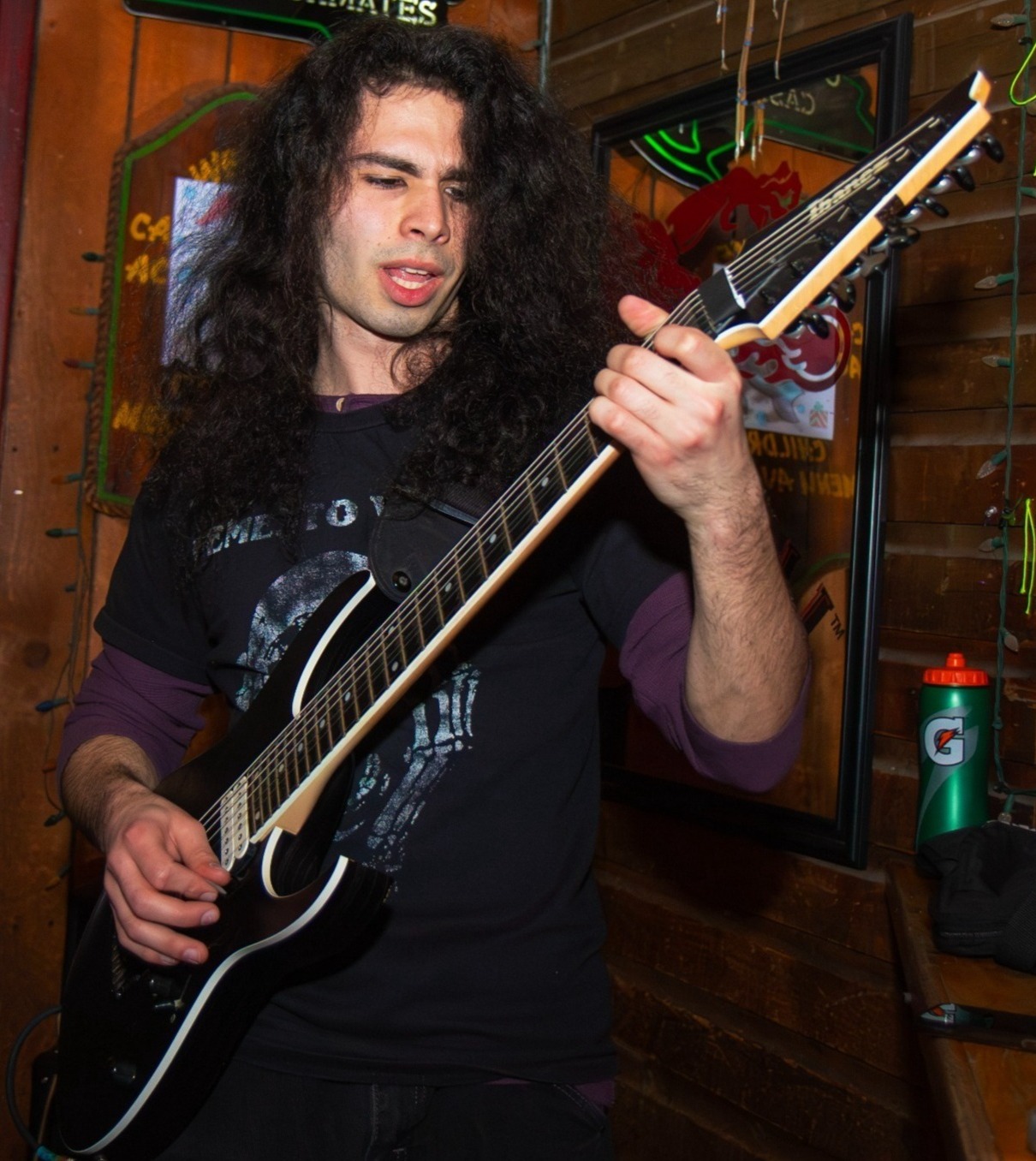
Although the goal may be to fall into that small percentage as a performer or composer, a degree in music or other arts fields provides transferable skills to other jobs. The Center for Career Development at the University of Tennessee, Knoxville compiled a resource to aid in advising all students on the career opportunities available to all majors. For music majors, careers are broken down by performance, behind the scenes, composing/arranging, music business, etc. with each having a list of common career paths, employers and strategies for achieving those careers.
Vincent Mandracchia, another fourth-year music major with a double concentration in composition and jazz performance for guitar, is investigating the variety of paths he could pursue after graduation.
“I started discovering all these alternative things I could do in music that weren't just playing shows,” Mandracchia said. “Like owning your own recording studio and being an engineer. You could work at a venue and be a host. You could do all these different things that are in music but aren't just playing music.”
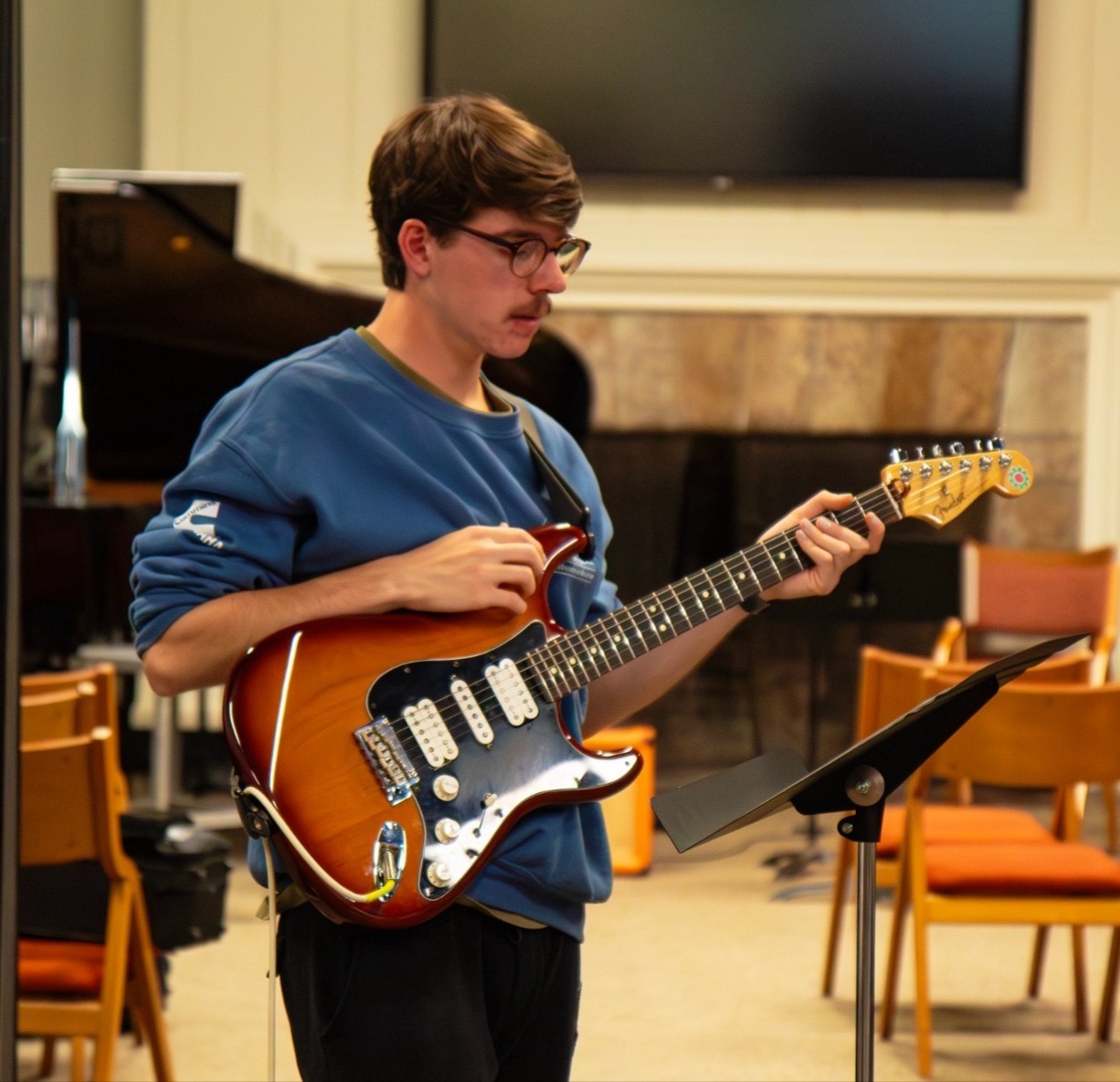
Mandracchia’s college years have been a time for him to work with a vast talent pool of students. He composes music with what works best for each instrument and player in mind. So far, he’s put out five singles and a live album called “The Shepard Takes.”
The album was recorded in the fall of 2024 in SUNY New Paltz’s Shepard Theater, a small performance space in College Hall where the music department is housed. The project was a DIY setup using the resources available to music students, from the space to the microphones to the recording software.
The band for the album was made up of fellow music students Sawyer Gold on bass, Theo Berliner on guitar, Daniel Palladino on drums, Myles Lino and Enzi Pascarella on saxophones and Aileen McCarthy on vocals.
In his final semester, Mandracchia is doing it again, only bigger. For the first album, there were five musicians and now there are nine. The band consists of a trombone, two tenor saxophones, one alto saxophone, two guitars, piano, bass and drums.
“I think the biggest advantage, being in college studying music, has been forcing myself to actually do things and go through with projects,” Mandracchia said. “A lot of the stuff that I've written over the past four years, I probably could have written on my own, but I never would have done anything with it. Especially the stuff that I didn't think was going to work out, I absolutely would not have performed or put out there.”
With graduation fast approaching, Mandracchia is looking toward his future of pursuing a music career with little direction on where to turn.
“Going into music as a career is really hard,” he said. ”It's possible, but it kind of takes a different approach, because it's not like other jobs where you find a posting for your job on Indeed and then you work there for 30 years. I think there's less of an understanding of what a career in music means for a lot of people.”
This fear of finding success in music leads many young musicians to abandon their passion for a job with a more predictable and stable outcome for their future. For Mandracchia, he does not let that fear discourage him from pursuing music.
“I'd love to be working in music in 10 years, but what kind of music and to what success? I don't know what it's going to be,” said Mandracchia. “I feel bad whenever people are studying music and they get to senior year, like, ‘I don't really think I'm gonna do music after I graduate.’ I feel bad because I have that passion to keep going and do whatever I can with it, but I guess not everyone has that, or not everyone feels like it's viable.”
Mid-Career With Music
Music provides people with a social and cultural link to the world around them. There are health benefits associated with listening and playing music from the physical to the social and emotional. According to the study “Influence of music on the hearing and mental health of adolescents and countermeasures,” music can help adolescents regulate their emotions, enhance creative and intellectual development and foster social connections. For adults, the benefits continue past their childhood in aiding with mental health impacts of stress, anxiety and depression.
Children and teens who are able to participate in music, especially in group settings such as band classes in school or extracurricular music activities, have been linked to higher academic performance and graduation rates. They also develop social skills like sharing, team building and overall communication and language use. This, in turn, can provide adolescents with a passion and a community of like-minded individuals.
Rock Academy is a year-round, performance-based music school in Saugerties, New York. Founded by Jason Bowman 12 years ago, the school offers children ages 8 to 18 years old weekly lessons to learn an instrument of their choice: guitar, bass, drums or keyboard. Students also participate in one of the five shows produced each season, spring, summer and fall, and attend weekly rehearsals with the other performers. They also offer lessons for adults as interest in learning music increased during the pandemic when people had more time on their hands for creative endeavors.
“People in town have credited us with cleaning it up, giving the kids somewhere to go and something constructive to do, as opposed to just getting high and hanging out,” said Bowman. “Even kids who didn't know they had an interest [in music], sometimes just come for the camaraderie and then decide they have an interest and then pursue it.”
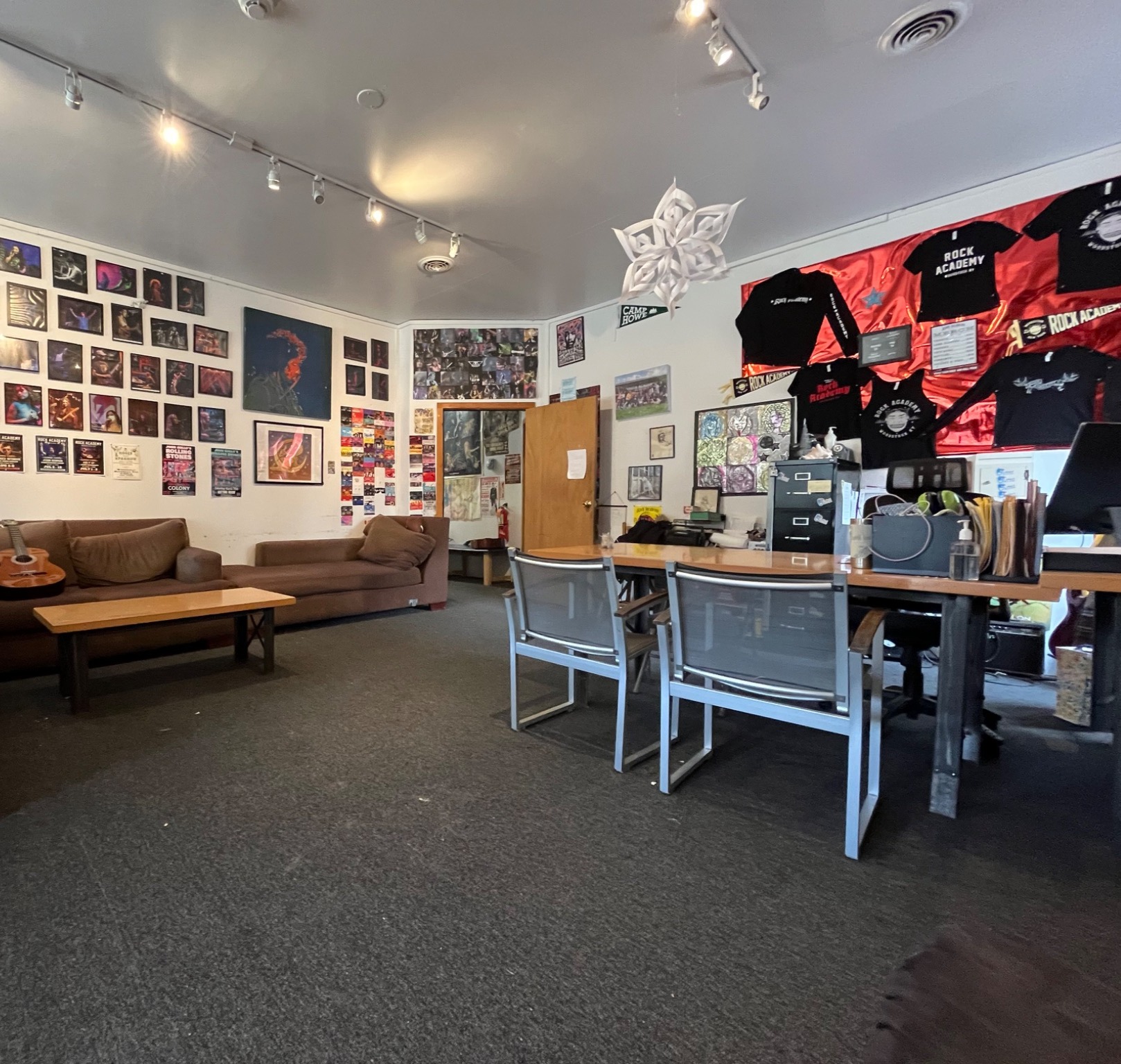
The mission of Rock Academy is to provide a space where students don’t just learn how to play an instrument but how to become professional musicians. Their students come from all over. Some travel from other parts of the state and others have gone as far as to move to be a part of the community. The academy pushes their students and offers their higher-level performers opportunities like being in the “show band” that goes on a week-long tour performing with stars like the Violent Femmes and Blondie.
“Success in any industry requires a certain amount of luck, which we don't actually believe in here. It requires time and place,” Bowman said. “As long as you're in the right place at the right time, there's your luck. So you just got to keep showing up, and you have to stay in shape, meaning you've got to be practicing every day. You've got to be ready for that call.”
For students who pursue music as a career and for those who enjoy it as just a hobby, the school provides a sense of community and opportunities for friendships. A particularly hard time for these bonds was during the COVID-19 pandemic. Rock Academy stayed in operation offering online lessons followed by in-person lessons fully masked.
“We bought a tent, we bought heaters,” Bowman said. “We bought anything we could buy to make sure people could see each other and say something mean or something nice or whatever it was to each other because that's what humans need, they need that interaction.”
As a musician and teacher with over 30 years of experience, performing and teaching simultaneously has always been the plan for Bowman. “I started in school when they started us on instruments at 10,” he said. “I got my first paying gig at 10, and I got my first student at 10.”
Bowman turned his lifelong passion for music into a career as a teacher and touring musician, a goal shared by many of his students and other instrumentalists, singers and composers.
Education is a common path for musicians, whether in traditional K-12 schooling and higher education settings or as a private tutor or an instructor at music schools like Rock Academy. Out of 2022 graduates with visual and performing arts degrees, 18.6% went into education as their main occupation.
“I didn't intend to be a teacher. I just got lucky,” said Roy Thompson, an audio engineer and adjunct professor based in New Paltz, New York. His two courses, basic and advanced recording, teach students how to use digital audio workstations (DAWs), record live performances, edit, mix and master music.
He attended SUNY Oneonta as a music industry major intending to work as a mixing engineer as his career. Since Thompson’s graduation in 2012, he has worked in recording studios with well over bands, run live sound for The Chance theater in Poughkeepsie, made karaoke backing tracks and created parody music videos on YouTube. He found his way to higher education in 2017, sticking with it ever since along with his other side projects.
“Teaching is the best. Number one, I just get to talk about the s**t that I care about all week, and when it actually lands with students, that's really fun,” said Thompson. “And I've learned my skills more from having to explain. Like compression makes no sense, but if you explain it 1000 times, or however many dozen times I have had to over the last couple years, it’s like, ‘Oh, I get it.’”
Postsecondary educators like Thompson make up the second-largest career path with 7.1% of the 2022 population. The average wage for the position is $63,000, give or take $5,000. In Ulster County, the livable wage is $26.24 an hour for a single adult. Working full time, this amounts to $54,580 annually. For those with children, the livable wage only increases.
Data visualization by Alyssa Sciarrone
“Sometimes you just do gigs to make the rent,” said Thompson. “But you can zone in over time, like, ‘this is my health insurance here.’ ‘I can't really leave this until I've got a nest egg available to cut the cord from here.’ So that's also something to think about, because if you're going to start your own business, or just be freelancing, contract labor, you have to make money, but you're also going to need insurance, to pay your quarterly taxes and life will become very real very quickly."
Retiring? Not Yet.
For musicians who reach retirement age, it’s not always time to stop playing. The reality is a mix of having a career where it is unlikely to have a pension, 401k or having made enough money over time for a personal retirement fund and a true passion for music with no desire to stop.
In some cases, a pension can be possible. The American Federation of Musicians and Employers’ Pension Plan gives retirement benefits on top of other funds like social security. It is open to all musicians if they are employed as a musician or by the American Federation of Musicians, the fund or any employer approved by their board of trustees. This is only for those whose employer contributes to the fund on their behalf – not freelancers.
Rick Schneider is a lifelong musician with no plans to retire any time soon. Since he was a child Schneider has had a passion for music; always playing his 45s and listening to the radio with his favorite DJs Scott Muni, Jim Kerr and Vin Scelsa. In 1984, he played his first paid gig and has since never stopped playing guitar and writing music.
“I got to a point from playing and hanging out in bars that to make a living at being a musician, it's a lot of skill, a lot of practice and a lot of luck,” Schneider said. “So I enjoyed all that, building a career in music, and I couldn't sustain myself and pay all my bills, so I got a job… realizing that dream is not going to be the million dollar experience I'd like it to be, but a couple extra dollars here or there to put gas in the car eat a good meal, is always good.”
Schneider began working as a sound engineer at the Tinker Street Cafe and the Joyous Lake, two music venues that have since closed in Woodstock, New York. He started by filling in a couple of nights a week and worked his way up to become their main engineer as well as booking, hosting and managing.
In his time at Tinker Street Cafe, he was approached by WDST Radio Woodstock with the opportunity to become a radio DJ, which he accepted. Since 1999, Scheider has worked in radio as a DJ, production director and music director. In 2007, he joined WKZE as the morning show host and has been doing so ever since.
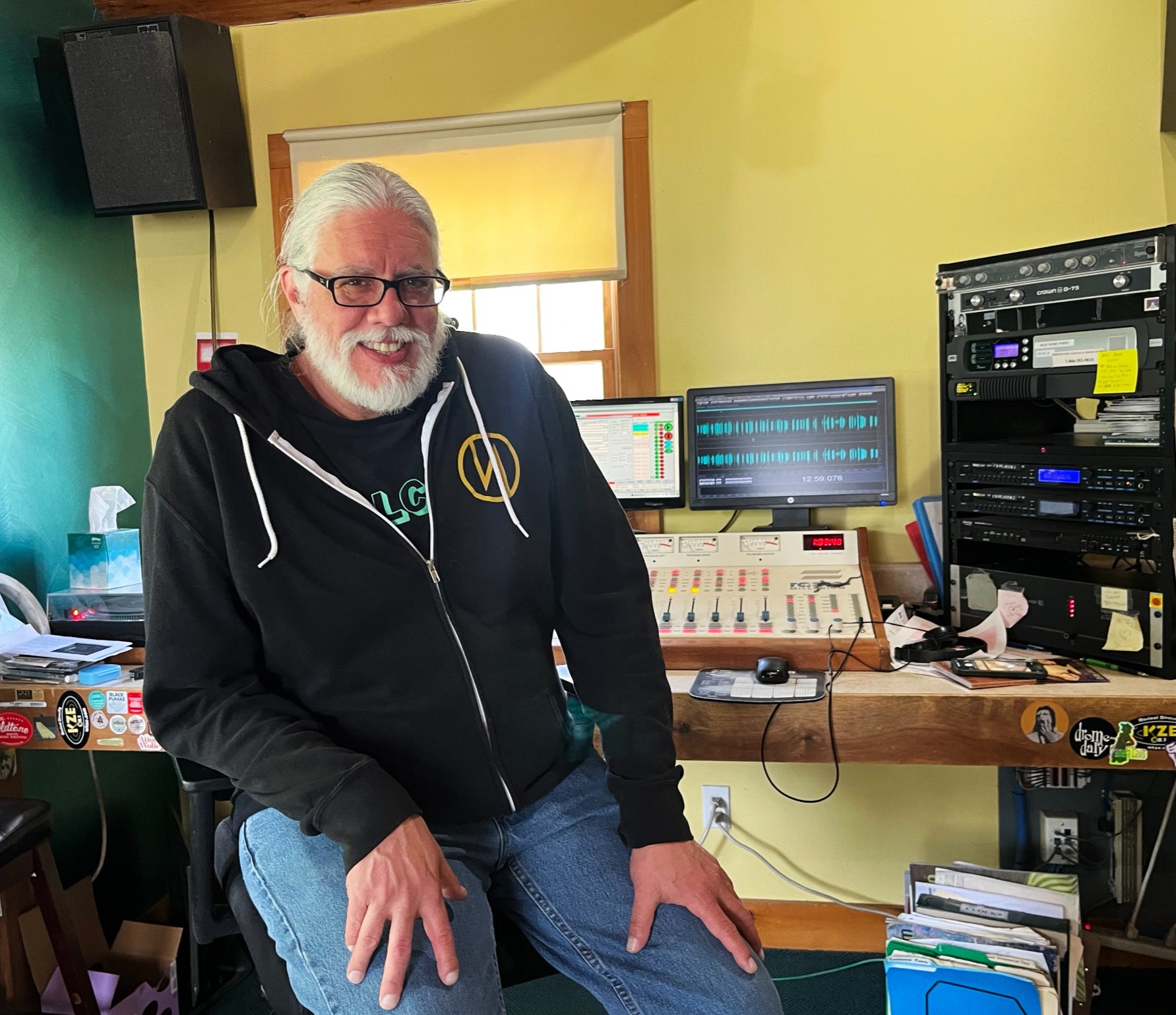
Radio DJing is a disappearing job in the music industry. According to the US Bureau of Labor Statistics, there is a projected -4% growth rate in employment opportunities for 2023-2033. Those hired are most likely replacing previous DJs who have since retired or changed careers, rather than finding new positions being created.
Schneider is still an active musician while DJing, occasionally gigging in the area with his band, Mister Roper. Professionally and as a hobby, music has always and will continue to be a major part of his life.
“Music, as a language, does so many things," said Schneider. "It soothes, heals, brings people together, it's quite an amazing force. I've used that force and the music itself to make money and have a career, which I didn't think was a possibility when I was growing up.”
While the chances are slim and delving into music can be a risk, it is possible to make a living from it. Dennis Yerry is a professional musician, composer and musical director. He started as a child playing organ in church in his hometown of Shandaken, New York, and briefly attended SUNY New Paltz as a music major for a year before venturing into the professional world at 18 years old.
Yerry’s jobs within music vary from studio recordings to teaching private lessons to sound designing entire theater productions. He has worked on various documentaries and films as both a composer and performer.
“I really love working in theater, writing music for theater,’ said Yerry. “I do sound design for ‘Onto These Hills’ down in North Carolina. And so I wrote some of the music, and I work on programming, the sound and everything for the theater down there.”
Music and theater have also served as a connection to his Iroquois identity. “I was doing a show in Denver, Black Elk Speaks,” he said. “I met Ken Little Hawk, and it was an idea that I had, that I wanted to put together a project that combined the Native American music, philosophy and thoughts with contemporary music.” Thus, he created The Hawk Project and released the album “Let Us Put Our Minds Together.”
Yerry reiterated that there are opportunities in music outside of just performing on a stage, but if performing is the dream, he has advice:
“I tell my students not to try to think of themselves in competition with anybody. I tell them try to find what you do best or what you love the most, and put all your energy into that, and think good things. Things work better for you if you're doing that and you're not trying to compete with other people.”
